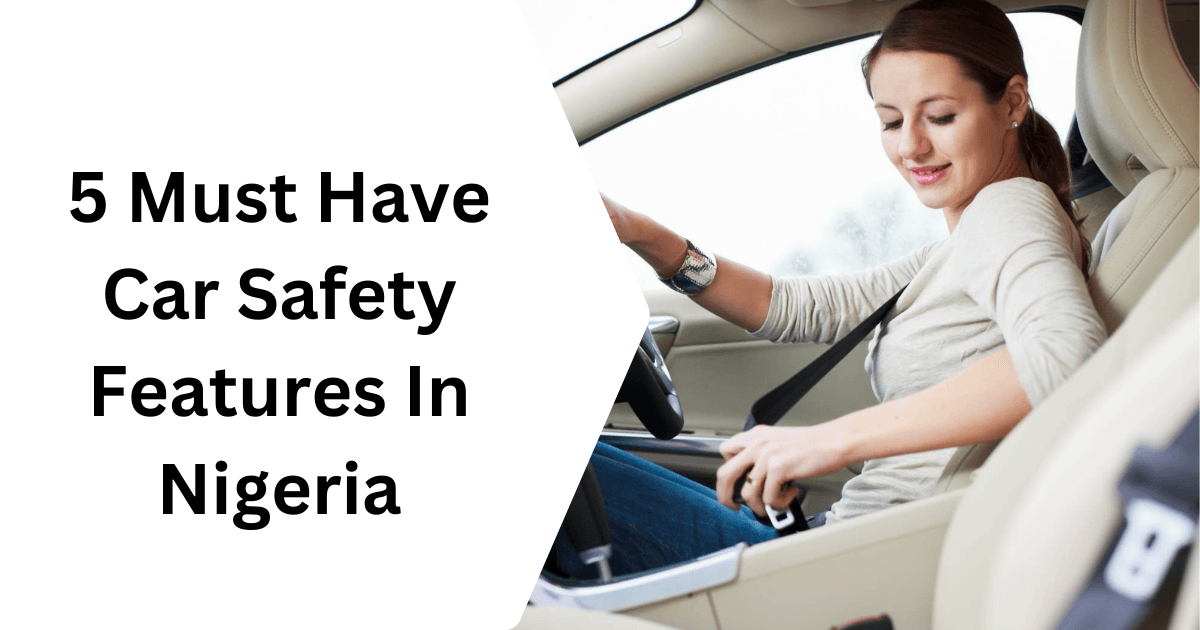Driving in Nigeria has a lot of unique challenges, from going through heavy traffic in cities to dealing with bad roads with potholes and debris. With these conditions, having the right car safety features is crucial. These features not only protect drivers and passengers but also improve control and handling in various situations, reducing the likelihood of accidents.
This article highlights 5 must have safety features every car should have in Nigeria. Whether you’re considering a new car or thinking about upgrading your current one, these must-have features can enhance your safety and give you peace of mind on the road. Let’s take a closer look at each of them and why they’re so important for drivers.
5 Must Have Car Safety Features In Nigeria
Anti-lock Braking System (ABS)
The Anti-lock Braking System (ABS) is a safety feature designed to prevent the car’s wheels from locking up during braking, especially in emergencies. When you press the brake pedal, ABS automatically regulates the brake pressure to keep the wheels rotating instead of skidding. This allows the driver to maintain better control of the vehicle, even on slippery or uneven surfaces. ABS uses sensors to monitor wheel speed and adjusts braking power as needed to prevent lock-ups, making it an essential feature for safe driving.
The benefits of ABS are significant, particularly on rough roads where sudden stops and unpredictable conditions are common. With ABS, drivers can steer effectively while braking, which can help avoid obstacles or other vehicles. This feature is especially useful during rainy seasons, as it reduces the risk of skidding on wet roads.
Airbags
Airbags are an essential car safety feature designed to protect passengers in the event of a collision. They are inflatable cushions located throughout the car, such as in the steering wheel, dashboard, and sometimes the sides of the seats. When a collision occurs, sensors in the vehicle detect the impact and deploy the airbags within milliseconds. These airbags create a barrier between passengers and hard surfaces, absorbing some of the force and reducing the likelihood of serious injuries.
The benefits of airbags are substantial, as they can significantly reduce the risk of injury during accidents. In high-impact crashes, airbags can help protect vital areas like the head, neck, and chest, minimizing the chance of severe trauma. This is particularly important in Nigeria, where road conditions and traffic can increase the likelihood of sudden accidents.
Rearview Camera and Parking Sensors
A rearview camera and parking sensors are features designed to assist drivers when reversing or parking. The rearview camera, usually located on the back of the car, provides a clear view of what’s behind the vehicle on a screen in the dashboard. Parking sensors, placed on the rear (and sometimes the front) bumper, use ultrasonic technology to detect objects nearby. When the car approaches an obstacle, the sensors emit a beeping sound that increases in frequency as the object gets closer, helping drivers navigate tight spaces more easily.
The benefits of rearview cameras and parking sensors are particularly valuable in busy urban areas, where parking can be challenging. These features help reduce blind spots, making it easier to see small objects, pedestrians, or other vehicles that might be behind the car. By alerting drivers to nearby obstacles, parking sensors also prevent minor accidents, such as bumper scrapes or collisions with unseen objects. Together, these tools enhance safety and convenience, making parking in crowded spaces simpler and helping to protect the vehicle from unnecessary damage.
Electronic Stability Control (ESC)
The Electronic Stability Control (ESC) is a safety feature designed to help drivers maintain control of their vehicles during sudden manoeuvres, such as sharp turns or swerves. ESC works by monitoring the car’s movement and steering input, automatically adjusting engine power and applying brakes to individual wheels as needed. This helps prevent the car from skidding or sliding, especially on slippery or uneven road surfaces. ESC is always active and operates quietly in the background, stepping in only when it detects a loss of control.
The benefits of ESC are significant, as it greatly enhances the driver’s ability to avoid accidents caused by skidding or oversteering. This feature is particularly useful in Nigeria, where road conditions can be unpredictable, especially during rainy seasons.
Tire Pressure Monitoring System (TPMS)
The Tire Pressure Monitoring System (TPMS) is a feature that warns drivers when the air pressure in one or more tires is too low. It works through sensors in each tire that constantly check pressure levels. If a tire loses too much air, TPMS sends an alert to the dashboard so the driver can fix it right away. Keeping the right tire pressure is important for safe and smooth driving.
TPMS is especially helpful for Nigerian drivers, where rough roads can easily affect tire pressure. When tires are properly inflated, the car handles better, brakes more effectively, and even uses less fuel. Plus, TPMS can help prevent flat tires or blowouts by letting you know if there’s a problem. With this system, drivers can keep their tires in good shape and enjoy safer, more efficient driving.
FAQs
1. How does the ABS improve safety?
ABS prevents the car’s wheels from locking up during hard braking, which helps you maintain control of the vehicle. This is especially useful on wet or uneven roads, as it reduces the chances of skidding. With ABS, you can steer while braking, helping you avoid obstacles and potentially reducing the severity of accidents.
2. Why is the TPMS important for Nigerian drivers?
TPMS alerts you when your tyres have low pressure, which is vital on Nigerian roads where rough surfaces can cause tyres to lose air quickly. Proper tire pressure improves handling, braking, and fuel efficiency.
3. Is it safe to rely on ESC in all driving conditions?
ESC is designed to help you maintain control during sudden maneuvers, such as sharp turns or swerves. While it works in various conditions, ESC is especially helpful on slippery or uneven roads. However, it’s still important to drive carefully, as ESC is not a substitute for safe driving practices. It enhances stability but doesn’t replace the need for careful and attentive driving.
Having important safety features like airbags, anti-lock brakes, and stability control can help prevent accidents in Nigeria. Choosing these features makes driving safer on the country’s busy and sometimes rough roads.




